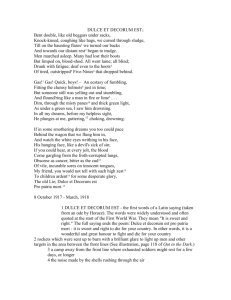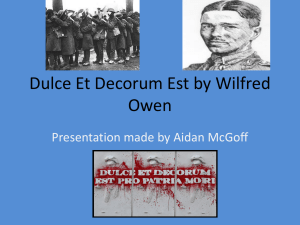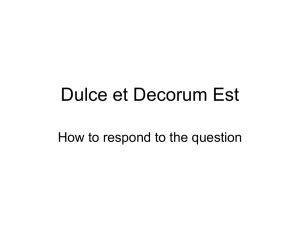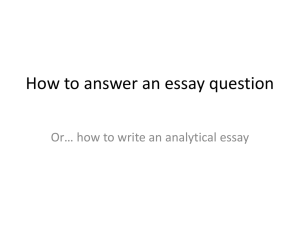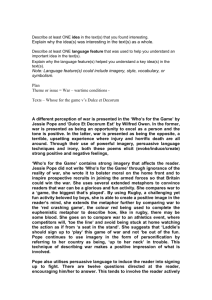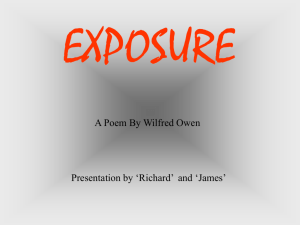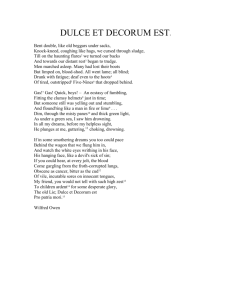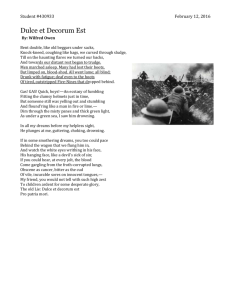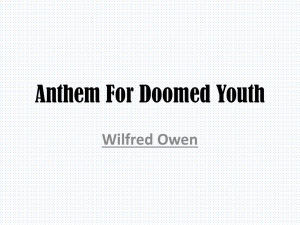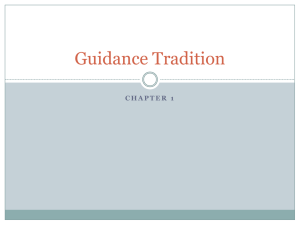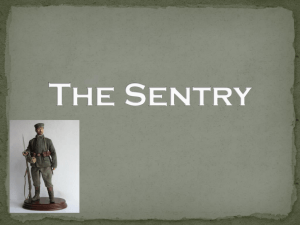Dulce et Decorum Est: Sample Essay Analysis
advertisement
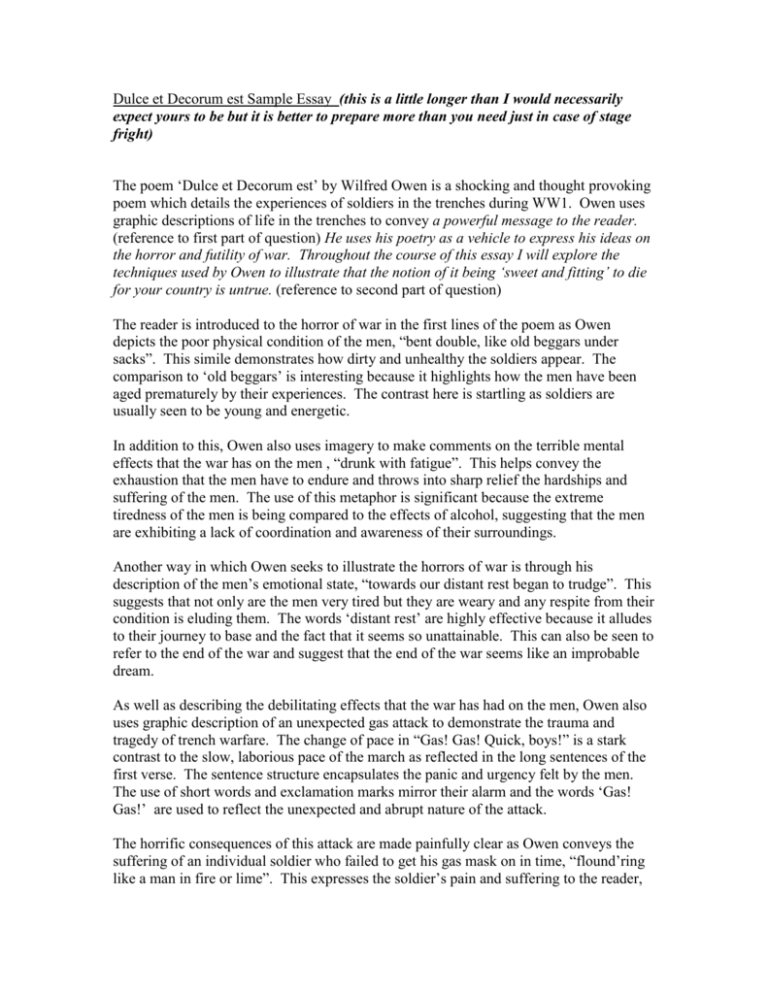
Dulce et Decorum est Sample Essay (this is a little longer than I would necessarily expect yours to be but it is better to prepare more than you need just in case of stage fright) The poem ‘Dulce et Decorum est’ by Wilfred Owen is a shocking and thought provoking poem which details the experiences of soldiers in the trenches during WW1. Owen uses graphic descriptions of life in the trenches to convey a powerful message to the reader. (reference to first part of question) He uses his poetry as a vehicle to express his ideas on the horror and futility of war. Throughout the course of this essay I will explore the techniques used by Owen to illustrate that the notion of it being ‘sweet and fitting’ to die for your country is untrue. (reference to second part of question) The reader is introduced to the horror of war in the first lines of the poem as Owen depicts the poor physical condition of the men, “bent double, like old beggars under sacks”. This simile demonstrates how dirty and unhealthy the soldiers appear. The comparison to ‘old beggars’ is interesting because it highlights how the men have been aged prematurely by their experiences. The contrast here is startling as soldiers are usually seen to be young and energetic. In addition to this, Owen also uses imagery to make comments on the terrible mental effects that the war has on the men , “drunk with fatigue”. This helps convey the exhaustion that the men have to endure and throws into sharp relief the hardships and suffering of the men. The use of this metaphor is significant because the extreme tiredness of the men is being compared to the effects of alcohol, suggesting that the men are exhibiting a lack of coordination and awareness of their surroundings. Another way in which Owen seeks to illustrate the horrors of war is through his description of the men’s emotional state, “towards our distant rest began to trudge”. This suggests that not only are the men very tired but they are weary and any respite from their condition is eluding them. The words ‘distant rest’ are highly effective because it alludes to their journey to base and the fact that it seems so unattainable. This can also be seen to refer to the end of the war and suggest that the end of the war seems like an improbable dream. As well as describing the debilitating effects that the war has had on the men, Owen also uses graphic description of an unexpected gas attack to demonstrate the trauma and tragedy of trench warfare. The change of pace in “Gas! Gas! Quick, boys!” is a stark contrast to the slow, laborious pace of the march as reflected in the long sentences of the first verse. The sentence structure encapsulates the panic and urgency felt by the men. The use of short words and exclamation marks mirror their alarm and the words ‘Gas! Gas!’ are used to reflect the unexpected and abrupt nature of the attack. The horrific consequences of this attack are made painfully clear as Owen conveys the suffering of an individual soldier who failed to get his gas mask on in time, “flound’ring like a man in fire or lime”. This expresses the soldier’s pain and suffering to the reader, reminding them of the personal face of war through the torment of an individual man. This simile is extremely poignant as it highlights the extent of his distress and the use of ‘fire or lime’ compounds his torture as both are very vivid comparisons that allow the reader a glimpse of the agony that he is experiencing. As the poem progresses, Owen makes the far reaching effects of war abundantly clear by describing his own nightmares, “in all my dreams, before my helpless sight”. This line clearly demonstrates the brutal impact that war also has on the lives of those who survive and is very effective as it emphasises his torment as he has to relive the experience over and over in his dreams. The transferred epithet in ‘helpless sight’ communicates his frustration at the fact that he was unable to prevent his friend’s suffering at the time and now is reduced to being a passive observer. The poet strengthens his message in the last verse by emphasising the suffering of the soldier by referring to “the wagon that we flung him in”. This demonstrates the brutality of war and the desensitising nature of their experiences. The word ‘flung’ is shocking to the reader and inspires a profound emotional response because the word itself suggests a dismissive, violent action, indicating that there was no time for compassion or grief. It also suggests that this tragedy is commonplace and death has become just another part of life for the men, compounding the horror that is their day to day lives. Finally, the bitter irony of the poem is revealed in the last lines as he attacks those who would argue that death in war is glorious, “my friend, you would not tell with such high zest”. Here, Owen employs the use of second person to address the stay at home patriots and those who would encourage young men to give up their lives for their country. The use of ‘my friend’ is deeply ironic and betrays his anger as he holds these people accountable for what he and so many others has had to endure and claims that if only they were to witness the atrocities of war then they would realise the extent of the ‘old Lie’. The real irony of the poem, however, is in the title which Owen alludes to in the final line of his poem, “Dulce et Decorum est pro Patria Mori”. The reader now understands that this too is ironic. Instead of being a rousing and patriotic call to war, the poem is in fact the exact opposite. The use of ‘Dulce et Decorum est’ in the title is striking as the contrast between the patriotism of these lines and the graphic descriptions of the horrors of war encapsulates the disparity between the young recruits’ expectations and the realism of the war. In conclusion, the poem ‘Dulce et Decorum est’ by Wilfred Owen is a deeply poignant poem that uses a variety of powerful techniques to express a very powerful message. Through his descriptions of the physical, mental and emotional affects of war, Owen skilfully delivers a searing attack on those who would encourage young men to fight without understanding the real horrors of war. Owen seeks to shed light on these horrors and in doing so highlights the tragedy of innocent men who are misled into sacrificing their lives for their country.
